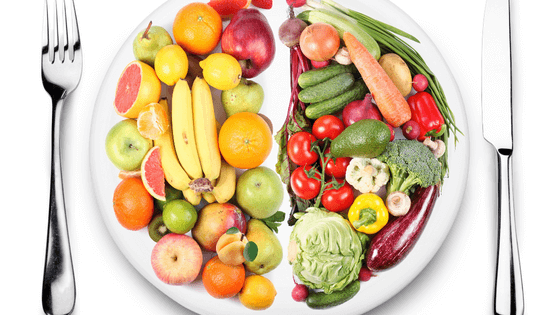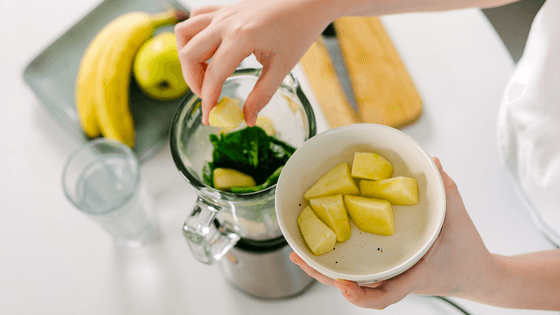10 Easy Habits For Sustainable Weight Loss You Should Try

Last Updated on May 12, 2024 by Lauretta Iyamu, PharmD
Are you looking to lose weight sustainably? Do you want to ensure your weight loss journey is as healthy and beneficial as possible? If so, then this blog post is for you! This article will share “10 easy habits for sustainable weight loss”. These habits are simple to incorporate into your lifestyle and help you reach your health goals without feeling deprived. So, read on to learn the secrets of sustainable weight loss!
What is Sustainable Weight Loss?
Sustainable weight loss refers to the process of losing weight in a way that is healthy, balanced, and long-term. It involves making lifestyle changes that are realistic and maintainable rather than relying on extreme or restrictive diets or other unhealthy weight loss methods that may result in short-term weight loss but are not sustainable in the long run. Sustainable weight loss focuses on making healthy choices that can be integrated into one’s daily routine rather than making drastic changes that are difficult to stick to. The goal of sustainable weight loss is to improve overall health and well-being rather than just losing weight for the sake of appearance.
Importance of Adopting Sustainable Habits for Weight Loss
There are several reasons why it is essential to adopt sustainable habits for weight loss:
Healthier outcomes: Sustainable weight loss habits, such as eating a balanced diet, getting enough sleep, and exercising regularly, can improve overall health and well-being. These habits can reduce the risk of chronic diseases such as obesity, heart disease, and diabetes.
Long-term success: Unsustainable weight loss habits, such as crash diets or extreme exercise regimes, may result in short-term weight loss but are challenging to maintain in the long run. On the other hand, adopting sustainable habits can help maintain weight loss over the long term.
Improved mental health: Sustaining unhealthy weight loss habits can be mentally and emotionally draining, as they may require constant effort and sacrifice. Adopting sustainable habits, on the other hand, can lead to improved self-esteem, body image, and overall mental health.
Balanced and enjoyable lifestyle: Sustainable weight loss habits can lead to a more balanced and enjoyable lifestyle, as they do not involve extreme or restrictive measures. This can improve the overall quality of life and make it easier to maintain healthy habits over the long term.
Setting Realistic Weight-loss Goals
When it comes to weight loss, it’s important to set realistic goals. If you’re aiming to lose 10 pounds in a month, follow through with your diet and exercise habits. Adjust your goals accordingly if you are still waiting to see your desired results.
Another essential factor to consider when setting weight loss goals is your overall health. If you’re struggling with an illness or are on medication that can affect your weight, consult your doctor before starting a weight loss program. Likewise, if you have any pre-existing health conditions, discuss them with your doctor before beginning any weight loss program.
Finally, remember that weight loss is a gradual process. Don’t expect to drop 10 pounds in a week or two — realistically, it may take several months or even years to achieve significant weight loss. So be patient, and keep up the excellent work!
10 Habits for Sustainable Weight Loss
Habit #1: Keep a food journal

Keeping a food journal is one of the easiest and most effective habits for sustainable weight loss. A food journal records everything you eat and drink throughout the day. It can be as simple as a handwritten log or as advanced as a smartphone app.
There are several benefits to keeping a food journal for weight loss:
- Increased awareness of your food intake: By recording everything you eat, you become more aware of your food choices and portion sizes. This can help you identify unhealthy eating habits or areas where you can make healthier choices.
- Improved accountability: Seeing your food choices written down can make you more accountable for your eating habits. It can be easier to justify unhealthy choices when they are not recorded but having them written down can help you make healthier choices.
- Tracking progress: A food journal can help track your weight loss. By recording your food intake and any weight changes, you can see the impact of your food choices on your weight loss journey.
- Identifying trigger foods: Keeping a food journal can also help you to identify any trigger foods that may be causing weight gain or hindering weight loss. By keeping track of how you feel after eating certain foods, you can identify any patterns and adjust your diet accordingly.
To effectively use a food journal for weight loss, try the following tips:
First, record your food and drink intake, including snacks and beverages.
- Be accurate: Record accurate portion sizes and ingredients.
Make it a habit: Make food journaling a daily routine. This will ensure that you have a complete record of your food intake.
- Don’t skip meals: It can be tempting to skip meals or snacks when trying to lose weight, but this can backfire. Instead, try to eat regular, balanced meals and snacks to keep your metabolism running smoothly.
- Use it as a tool: Use your food journal to identify unhealthy eating habits and make changes to your diet. Don’t beat yourself up for every unhealthy choice, but instead, use the journal to help you make healthier choices in the future.
Incorporating a food journal into your weight loss journey can be an easy and effective habit for sustainable weight loss. It can help you become more aware of your food choices, track your progress, and identify any trigger foods hindering your weight loss goals. By making food journaling a daily habit, you can take control of your weight loss journey and make sustainable changes that lead to long-term success.
Habit #2: Plan your meals in advance

A common weight loss habit is overeating junk food. When you eat these foods, your body goes into overdrive and releases excess calories. However, by following some simple tips to make healthy eating a part of your routine, you can fight these cravings and lose weight healthfully.
Breaking bad eating habits is a challenging task, but it can be easier with a plan. The best way to develop an eating plan is to think about what you want to achieve and then figure out how to make that happen. For example, if you want to lose weight, it’s essential to set realistic goals and track your progress regularly.
First, plan out your meals in advance. This will help you avoid impulse buys at the grocery store and ensure you get enough nutrients and fiber daily. Plus, it will save time in the kitchen!
Another key part of any successful diet is sticking to meal plans and snacks that fit those goals. This helps you stick to your routine and limits the number of unhealthy calories you’re ingesting. When preparing meals or snacks, keep things simple, or caloric density will be more appealing than healthy options. Finally, remember that physical activity is also essential for weight loss. Even 30 minutes of moderate-intensity exercise daily can help you burn calories and lose weight.
Habit #3: Incorporate more fruits and vegetables into your diet

Incorporating more fruits and vegetables into your diet is an easy and effective habit for sustainable weight loss. Fruits and vegetables are packed with nutrients and fiber and are low in calories, making them an excellent choice for weight loss.
There are several benefits to eating more fruits and vegetables for weight loss:
- Increased nutrients: Fruits and vegetables are rich in vitamins, minerals, and antioxidants, which can help to improve overall health and well-being.
- Improved digestion: The fiber in fruits and vegetables can help improve digestion and keep you full and satisfied, aiding in weight loss.
- Low-calorie content: Many fruits and vegetables are low in calories, which can help to reduce calorie intake and support weight loss.
- Variety: Incorporating a variety of fruits and vegetables into your diet can help to keep things interesting and prevent boredom, which can lead to unhealthy snacking or overeating.
To incorporate more fruits and vegetables into your diet for sustainable weight loss, try the following tips:
- Start small: If you’re not used to eating many fruits and vegetables, start small and gradually increase your intake.
- Make them accessible: Keep a stash of pre-cut fruits and vegetables in the fridge or freezer for easy snacking.
- Experiment with new recipes: Try incorporating different fruits and vegetables into your meals to keep things interesting.
- Add them to your meals: Add a side of fruit or vegetables or incorporate them into dishes such as stir-fries or omelets.
- Use them as snacks: Fruits and vegetables make great snacks, especially when paired with protein-rich food such as nuts or hummus.
By consciously incorporating more fruits and vegetables into your diet, you can quickly adopt a healthy and sustainable habit for weight loss. Not only will you be supporting your weight loss goals, but you’ll also be improving your overall health and well-being.
Habit #4: Drink plenty of water

Water is essential for our bodies to function correctly. When we don’t drink enough water, our cells become dehydrated and can’t work as effectively. Over time, dehydration can lead to weight gain and other health problems. Here are 10 easy habits you can adopt to help you stay hydrated:
- Drink plenty of water throughout the day, even if you already have enough. Drinking water throughout the day will help prevent cravings and ensure your body gets the proper hydration.
- Avoid sugar-sweetened drinks altogether; if possible, opt for unsweetened beverages such as plain water or herbal tea instead of sugary options like soda or juice. These drinks are less likely to cause tooth decay or weight gain due to their high levels of fructose sugar.
- Always keep a pitcher of filtered water on hand. If you’re able, keep a pitcher of filtered water near your bed to access it when needed. Most people should aim for about 8 glasses (32 oz) per day.
- Drink warm liquids first. Whenever possible, drink fluids warm rather than cold. This will help reduce the odds that the digestive system will turn them down because nothing cools off faster than a heated drink!
- Avoid caffeine and alcohol. Caffeine and alcohol dehydrate us more than any other substance. When we drink these items, it’s essential that we also sip on lots of fluids to avoid becoming dehydrated. The American Dietetic Association recommends drinking 3 cups (750 ml) daily, including liquids and solid foods.
Habit #5: Get enough sleep

Track Your Eating Habits: There are a few things you can do to help you stay on track with your weight loss goals. One of the most important things is ensuring you get enough sleep. When you’re sleep-deprived, it’s harder to control your eating habits.
Schedule regular breaks during the day to ensure you get the sleep you need. This means taking a 20-minute break every two hours, whether for a snack, a walk, or just some quiet time.
Another way to ensure you’re eating healthy is to track your food intake. This way, you can see where your calories are coming from and make healthier choices. Many apps and websites allow you to track your food intake, so find one that works best.
By following these tips, you can ensure you’re on track with your weight loss goals.
- Incorporate Exercise into Your Routine: The benefits of getting enough sleep are well documented but getting the recommended seven or eight hours every night can be challenging. To ensure that your weight-loss efforts are successful, incorporate exercise into your routine. For example, if you’re having trouble sleeping at night, try working out before bed so that you wind down and fall asleep easier. And if daytime naps don’t help, take a short nap in the middle of the day instead.
- Make Healthy Food Swaps: Prioritizing sleep is one of the most important weight-loss habits. Not getting enough sleep can lead to weight gain because it can increase appetite and cravings. Make healthy food swaps to help you get the recommended amount of sleep.
- Instead of eating late at night, try eating earlier in the day. Eating smaller meals throughout the day will help you avoid overeating later. Also, avoid drinking alcohol before bed because it can interfere with sleep.
Finally, keep a healthy environment in your bedroom by avoiding screens before bed and ensuring your room is dark and quiet.
Habit #6: Find a form of physical activity you enjoy

One of the most important things you can do for your weight loss goals is to incorporate exercise into your routine. Exercise helps burn calories and has other health benefits, such as reducing the risk of heart disease and stroke. Several different types of exercise can be incorporated into your weight loss plan, so find one suitable for your fitness level and schedule.
Some good exercises include:
- Walking
- Running
- Biking
- Swimming
- Strength training
- Yoga
Make sure to mix up your routine so you stay energized and energized. And remember to drink plenty of water while you are exercising; it will help to keep you hydrated and energized.
Habit #7: Eat mindfully

Eating mindfully can help you lose weight and keep it off. Here are 10 tips for eating mindfully:
- Eat slowly and deliberately. Taking time to eat allows your body to register that you’ve had a meal and starts the digestive process. This will help you eat less and avoid overeating.
- Avoid eating while watching TV, working on the computer, or reading a book. These activities tend to interrupt your regular eating habits and lead to overeating.
- Avoid eating in front of the television or computer screen. This environment is often full of unhealthy food choices and significantly contributes to weight gain.
- Ensure your meals include plenty of fruits, vegetables, whole grains, and lean protein sources. These foods are high in fiber, vitamins, minerals, and antioxidants, which are all important for weight loss.
- Avoid eating foods high in sugar, processed, and saturated fats. These types of foods are often unhealthy and contribute to weight gain.
- Drink plenty of water throughout the day to stay hydrated, and avoid eating sugary drinks or snacks that contain unhealthy ingredients.
- Avoid eating late at night because this is often when people tend to eat the unhealthiest foods.
Be mindful of how much physical activity you engage in daily. Exercise is key for weight loss and can help you burn calories even when you’re not eating anything.
Keep a food journal to track what you’re eating and how it affects your moods and energy levels. This will help you make more informed decisions about what foods to eat and help you stay on track with your weight loss goals.
Remember that weight loss is a gradual process, so don’t get discouraged if it takes some time to see results from mindful eating habits. With patience and perseverance, you can achieve sustainable weight loss!
Habit #8: Seek support from friends and family

Seeking support from friends and family can be beneficial for sustainable weight loss. Having the support of loved ones can provide motivation, accountability, and encouragement during your weight loss journey.
There are several benefits to seeking support from friends and family for weight loss:
- Motivation: Having the support and encouragement of loved ones can help to keep you motivated and on track with your weight loss goals.
- Accountability: Having someone to check in with can help to hold you accountable for your food choices and exercise routine.
- Social support: A support system can also provide a sense of community and belonging, which can be especially important when making lifestyle changes.
- Encouragement: Friends and family can provide encouragement and positivity during the ups and downs of the weight loss journey.
To seek support from friends and family for sustainable weight loss, try the following tips:
Seeking professional support when needed is an essential habit for sustainable weight loss. While it is possible to make lifestyle changes on your own, sometimes it can be helpful to seek the guidance and expertise of a healthcare professional or weight loss program.
- Share your goals: Let your loved ones know about your weight loss goals and ask for their support.
- Involve them in your journey: Ask your friends and family to join you in exercise or meal-planning activities.
- Keep them informed: Share your progress and challenges with your loved ones and ask for their encouragement and support.
- Seek professional help: If you feel like you need additional support, consider seeking the assistance of a healthcare professional or joining a weight loss program.
By seeking support from friends and family, you can create a supportive network that can help you to stay motivated and accountable on your weight loss journey. Don’t be afraid to seek help; remember that you don’t have to go through the journey alone.
Habit #9: Seek professional support when needed

There are several benefits to seeking professional support for weight loss:
- Expertise: A healthcare professional or weight loss program can provide expert advice and guidance on how to lose weight healthily and sustainably.
- Personalized plan: A professional can create a personalized weight loss plan based on your individual needs and goals.
- Accountability: Having someone to check in with and hold you accountable can be beneficial in the weight loss journey.
- Emotional support: A professional can provide emotional support and guidance to help you navigate any challenges or setbacks that may arise during the weight loss journey.
To seek professional support when needed for sustainable weight loss, try the following tips:
- Research your options: Look for reputable healthcare professionals or weight loss programs that have a proven track record of success.
- Talk to your doctor: Your primary care doctor can be an excellent resource for finding a weight loss program or specialist.
- Consider a nutritionist: A nutritionist can provide expert guidance on creating a healthy and balanced diet for weight loss.
- Seek out a support group: Joining a support group can provide a sense of community and encouragement during the weight loss journey.
By seeking professional support when needed, you can ensure that you are on the right track and get the guidance and support you need to achieve sustainable weight loss. So don’t be afraid to ask for help – it can be a crucial step in your weight loss journey.
Habit #10: Don’t be too hard on yourself

One of the essential habits for sustainable weight loss is not to be too hard on yourself. Losing weight can be challenging, and it’s natural to experience setbacks and challenges. However, it’s important to remember that weight loss is a journey, and it’s okay to make mistakes or have setbacks.
There are several benefits to being kind to yourself during the weight loss journey:
- Improved mental health: Being too hard on yourself can lead to negative emotions such as guilt or shame, which can undermine your weight loss efforts and affect your mental health.
- Increased motivation: Being kind to yourself can help to boost your motivation and confidence, which can be crucial for maintaining healthy habits over the long term.
- Improved self-esteem: Being too hard on yourself can lead to low self-esteem and body image issues, damaging overall well-being. Allowing yourself to be kind and compassionate can improve self-esteem and body image.
To be kind to yourself during the weight loss journey, try the following tips:
- Practice self-compassion: Instead of beating yourself up for mistakes or setbacks, try self-compassion. Remind yourself that everyone makes mistakes and is okay to be imperfect.
- Focus on progress, not perfection: Instead of trying to be perfect, focus on your progress and the positive changes you’ve made to your lifestyle.
- Seek support: Don’t be afraid to seek support when needed. Whether it’s a trusted friend, family member, or healthcare professional, seeking support can help to alleviate feelings of overwhelm or self-doubt.
- Take breaks: It’s essential to allow yourself time to rest and recharge. Don’t be afraid to take a break from your weight loss journey if you need to – it’s okay to prioritize your well-being.
By being kind to yourself during the weight loss journey, you can create a more sustainable and enjoyable experience. Remember that weight loss is a journey, and it’s okay to make mistakes or have setbacks. However, by practicing self-compassion and focusing on progress, you can stay motivated and confident on your weight loss journey.
Wrapping Up
In conclusion, adopting healthy and sustainable habits is key to achieving and maintaining weight loss. By incorporating these 10 easy habits into your daily routine, you can take control of your weight loss journey and improve your overall health and well-being.
From keeping a food journal and planning your meals in advance to incorporating more fruits and vegetables into your diet and seeking support from friends and family, these habits can help to ensure that your weight loss is healthy, balanced, and long-term.
Remember to be kind to yourself during the weight loss journey, and don’t be afraid to seek professional support. By taking small, consistent steps towards a healthy lifestyle, you can achieve your weight loss goals and create a more sustainable and enjoyable experience.
Take the first step towards sustainable weight loss today and start building healthy habits that will serve you well for years.



